×


We have detected your country as:
Please click here to go to the USA website or select another country from the dropdown list.
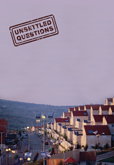
{image_1} Ma’ale Adumim, founded in 1975, is a medium-sized city not far fromJerusalem. It has a full-sized mall and around 35,000 inhabitants. It also is at the heart of a debate that threatens Israel’s relationship with the international community. The reason the city and a number of other communities are having such an acute political impact is because they are built on territory captured by Israel in the 1967 Six-Day War.
Continue Reading »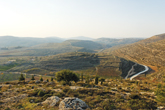
{image_1} Shiloh—where the tabernacle stood for 393 years—is all about God's presence among the people. God could have set up a throne on the highest mountain, but instead, He selected a hill surrounded by higher places. Worshipers could not see it if they were on the other side of the nearest range of hills, so they would have to make the effort to make the journey instead of having Him reveal Himself on every hilltop. This low hilltop rests between the Galilee, the Jordan River, the Dead Sea, and the Mediterranean. On its slope is a flat area that was an excellent place to put the tabernacle. Smoke from the sacrifices rose to heaven as a visible sign to visitors from far and wide that this was a place of active worship.
Continue Reading »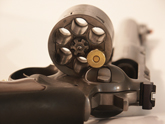
{image_1}Russia continues to send mixed signals in its dealings with Hamas. As a member of the Quartet (the UN, the EU, the US, and Russia), Moscow is a signatory to the decision not to have any dealings with Hamas until it fulfills three conditions: recognition of Israel, renouncing terror, and agreeing to be bound by past agreements signed between Israel and the Palestinian Authority.
Continue Reading »
{image_1}”We do not want war, but if war is forced on us, I suggest to our friends and enemies, as one, to be on the right side, on our side, on the side that has always won and will always win…For 61 years now, we have been burying our children, and there is no end in sight. This year still, our existence is under threat. From near and far, they rise to destroy us—and to their astonishment, we are not frightened. We are not running away from the fight.”
Continue Reading »
{image_1} The American National Aeronautics and Space Administration launched its first Lunar Reconnaissance Orbiter in its Vision for Space Exploration plan in June, using technology that was developed by an Israeli company. Sital Technology—headed by founder Ofer Hofman, CEO and General Manager Nir Hamzani, and Marketing and Sales VP Duli Yariv—was first contacted by NASA four years ago, shortly after the company's Web site was launched.
Continue Reading »
{image_1}An American plan to resolve the Israeli–Palestinian conflict within two years may lead to the establishment of “Hamastan in the West Bank [Judea and Samaria],” Strategic Affairs Minister Moshe Yaalon said during an event at the Washington Institute for Near East Policy. The peace process may take up to five years, Yaalon said, adding that “instant peace” will fail because of realities on the ground. The minister called for a reexamination of some basic assumptions underlying the peace process, including the two-state vision ostensibly being the only viable solution, and the perception that Israel's “occupation” and settlement activity constitute major obstacles for peace.
Continue Reading »
{image_1} Israel is in the midst of another long hot summer. It is a land of perpetual sunshine from March till November. There is no need to check the weather forecast because every day is the same—hot and sunny. It simply does not rain. When school lets out at the end of June, the sound of children’s voices fill the air. In Jerusalem, most homes are not air-conditioned, so we hear their voices clearly through our open windows.
Continue Reading »
{image_1}“It is easier to denature [change the nature of] plutonium than to denature the evil spirit of man,” Albert Einstein once said. Einstein’s rueful sentiment may, in fact, be proven true by engineers at Ben-Gurion University (BGU) of the Negev who have developed a denaturing technique that could help combat the evils of nuclear proliferation.
Continue Reading »
{image_1}ldquo;You don’t want a messianic apocalyptic cult controlling atomic bombs. When the wide-eyed believer gets hold of the reins of power and the weapons of mass death, then the whole world should start worrying, and that is what is happening in Iran.”
Continue Reading »
{image_1}Shavuot (Feast of Weeks or Pentecost), like other of the biblical festivals, was originally celebrated in relation to the agricultural seasons. It marked the end of the barley harvest and the beginning of the wheat harvest. As such, nature and the Divine have gone hand in hand on this holiday more than any other, and it is recognized as a wonderful time to appreciate the beauty of God’s creation.
Continue Reading »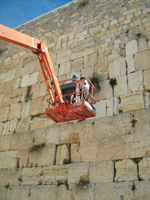
{image_1} The Israel Antiquities Authority (IAA) not only finds buried “treasures” of the past but works to preserve them. A year ago, the Western Wall Heritage Foundation conducted a survey of the state of the wall, which revealed that the physical condition of the stones was deteriorating. IAA decided to take urgent action.
Continue Reading »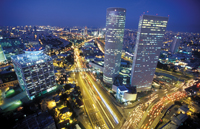
{image_1} While Jerusalem is considered the heart of the Jewish world, Tel Aviv is the heart of modern Israeli culture. In April, that heart beat into its 100th year. Founded on April 11, 1909 by a small group of Jews from the ancient port city of Jaffa (or Joppa), Tel Aviv has risen from bare sand to the second largest city in Israel with roughly 400,000 inhabitants and sets the standard for modern Jewish cities. It is home to the foreign nations’ embassies and the place to be for concerts and other cultural events, especially during its centennial year, with events planned all the way to December.
Continue Reading »All logos and trademarks in this site are property of their respective owner. All other materials are property of Bridges for Peace. Copyright © 2025.
Website Site Design by J-Town Internet Services Ltd. - Based in Jerusalem and Serving the World.